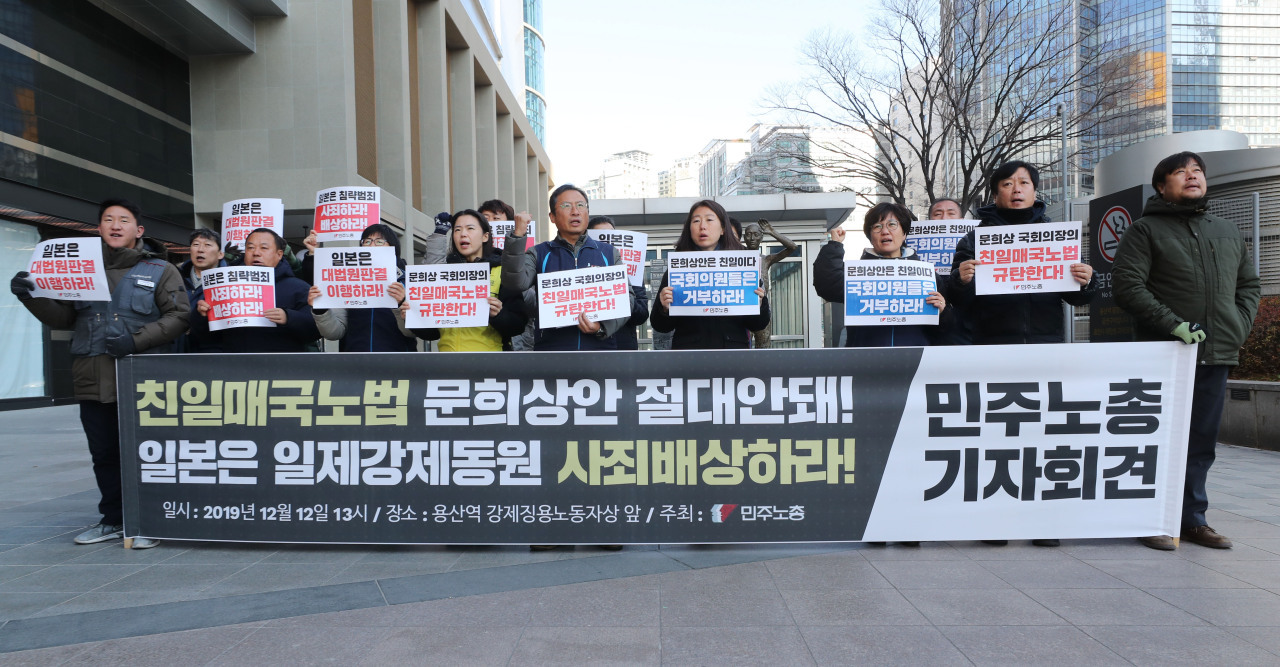South Korea’s National Assembly Speaker Moon Hee-sang is planning to introduce bills he contends will work to restore strained relations between Seoul and Tokyo over local court rulings that ordered Japanese companies to compensate Koreans forced to work for them during World War II
Korea’s two Supreme Court rulings a year ago plunged Seoul-Tokyo ties to a fresh low as Japan responded with outrage, saying the 1965 agreement -- which normalized bilateral relations following Japan’s 1910-45 colonial rule of the Korean Peninsula -- already resolved the issue.
Speaker Moon suggests in his bills establishing a fund, to be jointly created by Korean and Japanese citizens and companies, to compensate Koreans who were forced to work for Japanese companies or the Japanese military during World War II.
He believes the fund would make way for the two countries to work out differences, but experts say the proposal neither upholds the spirit of Korea’s Supreme Court rulings nor brings a victim-centered closure to the decadeslong dispute.
Seoul, Tokyo courts acknowledge victim’s rightsWhile the Japanese government maintains that the 1965 agreement settled individual claims once and for all, Japan’s highest court sees the forced labor victims’ rights just as Korea’s Supreme Court does.
“According to Japan’s Supreme Court in 2007, individual victims’ rights are not terminated,” said Choi Bong-tae, an attorney who helped to win the Supreme Court’s second ruling a year ago, when the Japanese firm Mitsubishi Heavy Industries was ordered to compensate Korean forced laborers.
Choi, who is a practicing attorney who chairs the Korean Bar Association’s Special Committee on the Human Rights of Victims Under Imperial Japan, was referring to a complaint filed by Chinese victims of forced labor.
“What that Supreme Court ruling in Japan means is redress outside of trial, without a compulsory court order,” Choi said, adding, “The Japanese firms could just compensate Korean victims without worrying about any criminal breach of trust, an action that usually follows a diversion of company money.”
The bottom line is that both Seoul and Tokyo’s highest courts recognize individual victims’ rights as intact, according to Choi, who noted those rights entail damages Japanese companies are obliged to pay.
Prosecutor-turned-attorney Chung Tae-won, who is also familiar with the issue, agrees that Japan’s 2007 Supreme Court ruling on Chinese forced laborers attests to the rights of individual victims.
Choi argues that under Moon’s bills, donations from Japanese firms would relieve their burden of paying damages to individual complainants because victims would forfeit their rights upon accepting compensation.
“Now, this is not what either country’s Supreme Court says,” Choi said, expressing concerns about the “donation bills” which he said would constitute a violation of the judgment of the two countries’ highest courts.
International civic groups echoed Choi’s misgivings. “Through donations, the bills essentially terminate the liability the Japanese government and companies face,” Japanese civic group United Coalition on the Resolution of the Forced Labor Dispute and the Past said on Dec. 12.
Victims disapprove of billsOpponents argue Moon’s bills also belittle endeavors to get Japan to make a heartfelt, public apology and seek atonement.
“Perpetrators should come forward to deliver apology and compensation,” local civic group Jeju Peace Butterfly said at rally near the Consulate-General of Japan in Jeju City on Dec. 13.
Experts agree that Speaker Moon’s bills do not embody a victim-centered approach. “Money isn’t the issue here,” said Yang Kee-ho, a professor of Japanese studies at Sungkonghoe University. “The victims demand an apology and atonement.”
Some experts say Moon’s proposal to have a donation-based foundation compensate victims on behalf of Japanese companies could violate the subrogation principle. “Under that principle, once the foundation makes compensation, it should seek equal payments from the Japanese firms,” Choi said.
“But, from what I see now, I don’t think that’s what the government or foundation is planning on doing,” Choi said.
While most Koreans show support for the bills, according to the latest poll, experts warn against pressing ahead with the proposal to improve ties between Seoul and Tokyo.
Yang, a Japanese studies professor, said, “Given that most of the victim do not see the bills as acceptable, I don’t think pushing the bills through the National Assembly represents the victim-centered approach Moon has so often advocated.”
“The public would see why victims and experts find the bills repugnant, if someone walks them through the proposal,” Yang said, referring to the same poll, which found that most experts opposed the bills.
Yang said the National Assembly should hold a hearing to see what others have to share on the divisive issue before pushing through the bills, which he said would leave victims with permanent change if the bills become law.
“There is a reason that it’s a decades-old dispute,” he said.
By Choi Si-young (
siyoungchoi@heraldcorp.com)




![[Herald Interview] 'Trump will use tariffs as first line of defense for American manufacturing'](http://res.heraldm.com/phpwas/restmb_idxmake.php?idx=644&simg=/content/image/2024/11/26/20241126050017_0.jpg)

![[Health and care] Getting cancer young: Why cancer isn’t just an older person’s battle](http://res.heraldm.com/phpwas/restmb_idxmake.php?idx=644&simg=/content/image/2024/11/26/20241126050043_0.jpg)

